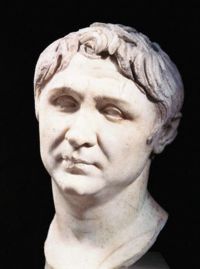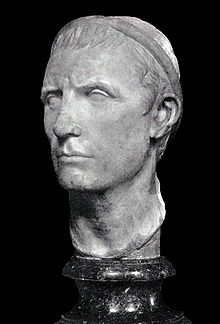Why is Vercingetorix so famous?
Vercingetorix was a Gallic leader. In fact, he was the best known, and most, able leader of the Gallic opposition to Caesar during the Gallic War of 58-51 BC. Vercingetorix became the leader of the great revolt against the Romans in 52 BC.
Julius Caesar, upon hearing of the revolt, rushed to put it down. Vercingetorix adopted the policy of retreating to heavy, natural fortifications, and burning Gallic towns to keep the Roman soldiers from living off the land. Caesar and his chief lieutenant Labienus lost minor engagements, but when Vercingetorix shut himself up in Alesia and summoned all his Gallic allies to attack the besieging Romans, the true brilliance of Caesar appeared. He defeated the Gallic relieving force, and took the fortress. Vercingetorix was captured, and put to death.


 Arminius was a German leader who lived in the 1st century. He had lived in Rome for sometime, and understood Rome’s military strategy. When the Romans invaded German territory, Arminius, along with the leaders of the other German tribes, used this knowledge to defeat the Romans at the Battle of Teutoburg Forest.
Arminius was a German leader who lived in the 1st century. He had lived in Rome for sometime, and understood Rome’s military strategy. When the Romans invaded German territory, Arminius, along with the leaders of the other German tribes, used this knowledge to defeat the Romans at the Battle of Teutoburg Forest.
 The first German leader of whom we have any record is Ariovistus, who was reigning in 58 BC, the year Julius Caesar entered Gaul. Ariovistus was the leader of a Germanic tribe, the Suebi, and he was constantly fighting with the Gauls, whom he defeated. The Romans considered him a ‘king and friend of the Senate’, but things changed when Gaul’s leaders asked Caesar for protection against King Ariovistus. The Gauls claimed he had brought in 120,000 Germans to settle on their lands, and had also taken hostages.
The first German leader of whom we have any record is Ariovistus, who was reigning in 58 BC, the year Julius Caesar entered Gaul. Ariovistus was the leader of a Germanic tribe, the Suebi, and he was constantly fighting with the Gauls, whom he defeated. The Romans considered him a ‘king and friend of the Senate’, but things changed when Gaul’s leaders asked Caesar for protection against King Ariovistus. The Gauls claimed he had brought in 120,000 Germans to settle on their lands, and had also taken hostages. Mark Antony was a Roman statesman and general. After Caesar defeated Pompey, Antony became Caesar’s second in command, and Caesar appointed him as Consul of Rome. On Caesar’s death, Antony joined with Caesar’s nephew Octavian to defeat the conspirators who had murdered Caesar. Later however, Octavian became his enemy when Antony married Cleopatra, Queen of Egypt. Octavian sent a fleet that destroyed the navy of Antony and Cleopatra, and Antony committed suicide.
Mark Antony was a Roman statesman and general. After Caesar defeated Pompey, Antony became Caesar’s second in command, and Caesar appointed him as Consul of Rome. On Caesar’s death, Antony joined with Caesar’s nephew Octavian to defeat the conspirators who had murdered Caesar. Later however, Octavian became his enemy when Antony married Cleopatra, Queen of Egypt. Octavian sent a fleet that destroyed the navy of Antony and Cleopatra, and Antony committed suicide.
 Augustus Caesar’s real name was Gaius Octavius .He was the grand nephew of Julius Caesar. In his will, Caesar had adopted Octavius and made him his heir, so Octavius changed his name to Gaius Julius Caesar. Octavian was a shrewd, brilliant, and astute politician. Upon his grand uncle’s assassination in 44 BC, Octavius went to Rome. There, on August 19th, at the age of 19, Octavius was elected Consul.
Augustus Caesar’s real name was Gaius Octavius .He was the grand nephew of Julius Caesar. In his will, Caesar had adopted Octavius and made him his heir, so Octavius changed his name to Gaius Julius Caesar. Octavian was a shrewd, brilliant, and astute politician. Upon his grand uncle’s assassination in 44 BC, Octavius went to Rome. There, on August 19th, at the age of 19, Octavius was elected Consul.


 Gnaeus Pompey was one of the key figures in the Roman revolution at the end of the period known as the Roman Republic. He rose to prominence serving Sulla in the first major Roman civil war, defeating the forces of Marius in Africa. Pompey quickly learned the political power of an army behind him. He led the Roman army against the rebels in Spain, and returned to Rome in triumph.
Gnaeus Pompey was one of the key figures in the Roman revolution at the end of the period known as the Roman Republic. He rose to prominence serving Sulla in the first major Roman civil war, defeating the forces of Marius in Africa. Pompey quickly learned the political power of an army behind him. He led the Roman army against the rebels in Spain, and returned to Rome in triumph. Spartacus was a Roman slave and gladiator, and leader of a famous slave revolt. He was sold into slavery, and trained at the gladiatorial school in Capua, north of Naples. He escaped in 73 BC, and took refuge on nearby Mount Vesuvius, where large numbers of other escaped slaves joined him. Leading his army of runaway slaves, which has been estimated to have reached 100,000 men, Spartacus defeated a series of Roman attacks using tactics which would now be called guerrilla warfare.
Spartacus was a Roman slave and gladiator, and leader of a famous slave revolt. He was sold into slavery, and trained at the gladiatorial school in Capua, north of Naples. He escaped in 73 BC, and took refuge on nearby Mount Vesuvius, where large numbers of other escaped slaves joined him. Leading his army of runaway slaves, which has been estimated to have reached 100,000 men, Spartacus defeated a series of Roman attacks using tactics which would now be called guerrilla warfare. Mithridates became king when he was only twelve, and so, it was his mother who actually wielded power. However, when he was seventeen, he had his mother imprisoned, and seized power. He also killed off several of his brothers to eliminate any competition for the throne!
Mithridates became king when he was only twelve, and so, it was his mother who actually wielded power. However, when he was seventeen, he had his mother imprisoned, and seized power. He also killed off several of his brothers to eliminate any competition for the throne! Cornelius Sulla came to prominence mainly in the Social War that was fought from 91-89 BC. When in 88 BC, Mithridates, King of Pontus, attacked the Roman province in Asia; the senate decided that Sulla, who was then one of the current consuls, would be commander of the army against Mithridates. After successfully completing his campaign against Mithridates, Sulla returned to Italy, marched to Rome, and took charge politically by force, as a dictator.
Cornelius Sulla came to prominence mainly in the Social War that was fought from 91-89 BC. When in 88 BC, Mithridates, King of Pontus, attacked the Roman province in Asia; the senate decided that Sulla, who was then one of the current consuls, would be commander of the army against Mithridates. After successfully completing his campaign against Mithridates, Sulla returned to Italy, marched to Rome, and took charge politically by force, as a dictator. Gaius Marius was a Roman general and politician. He was a strong and brave soldier, and a skilful general, popular with his troops, but he showed little flair for politics, and was not a good public speaker.
Gaius Marius was a Roman general and politician. He was a strong and brave soldier, and a skilful general, popular with his troops, but he showed little flair for politics, and was not a good public speaker. Publius Cornelius Scipio was born into one of the great aristocratic families of Rome. Even as a boy, he proved his bravery when, seeing his father wounded and cut off by the enemy during a battle, he charged forward, and saved him. Scipio began his career as a military tribune. In 210, the Romans decided to send an army to Spain against the Carthaginians, but it is said that no senior general would undertake the task, and that young Scipio offered himself as a candidate. He was determined to hold the Carthaginian armies at bay, and prevent them from sending reinforcements to Hannibal in Italy. He was also determined to turn back the tide of war, and to drive the enemy out of the Peninsula.
Publius Cornelius Scipio was born into one of the great aristocratic families of Rome. Even as a boy, he proved his bravery when, seeing his father wounded and cut off by the enemy during a battle, he charged forward, and saved him. Scipio began his career as a military tribune. In 210, the Romans decided to send an army to Spain against the Carthaginians, but it is said that no senior general would undertake the task, and that young Scipio offered himself as a candidate. He was determined to hold the Carthaginian armies at bay, and prevent them from sending reinforcements to Hannibal in Italy. He was also determined to turn back the tide of war, and to drive the enemy out of the Peninsula. Philip V was one of the last great Macedonian sovereigns ruling from 221 to 179, whose attempt to extend Macedonian influence throughout Greece, resulted in his defeat by Rome.
Philip V was one of the last great Macedonian sovereigns ruling from 221 to 179, whose attempt to extend Macedonian influence throughout Greece, resulted in his defeat by Rome.
